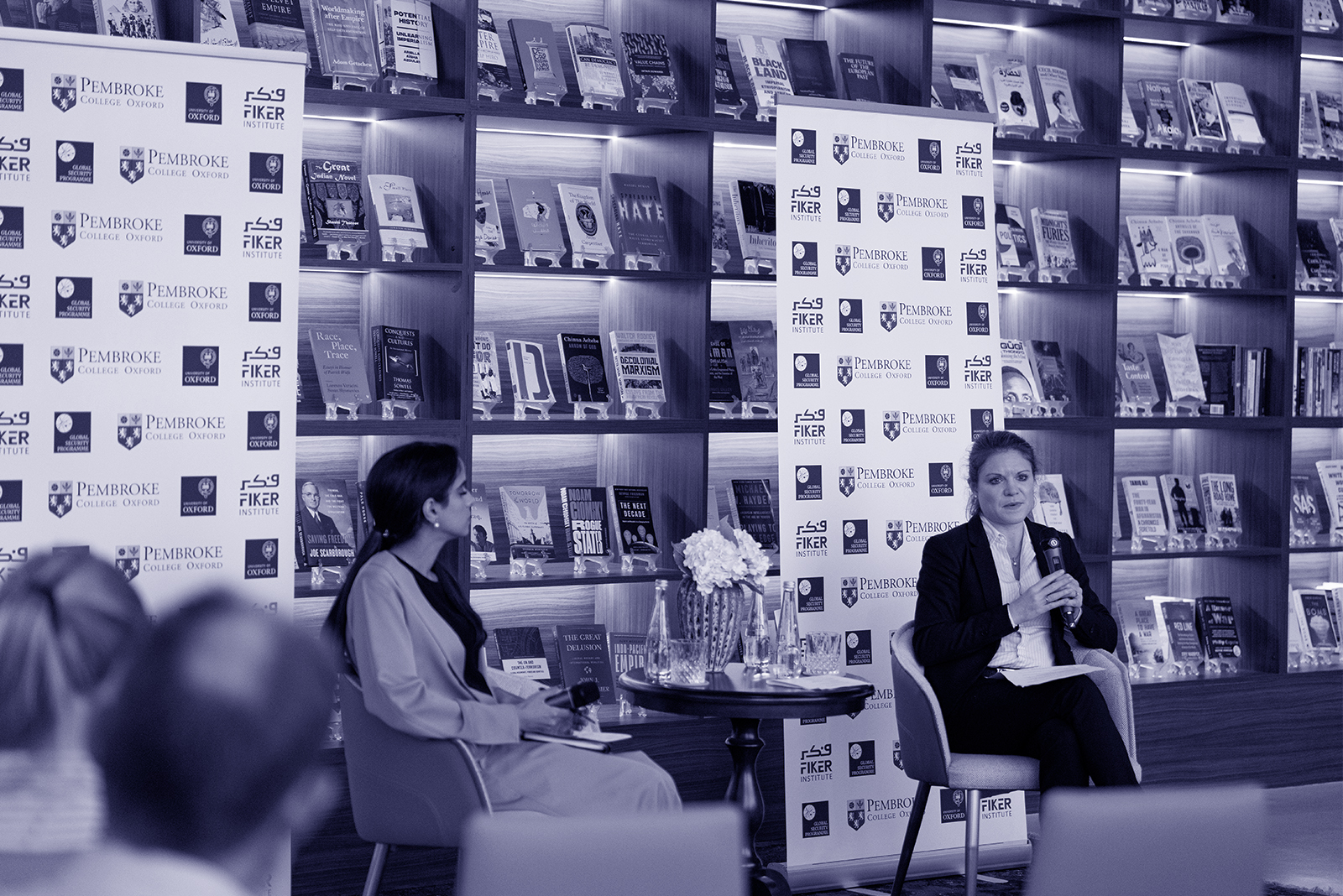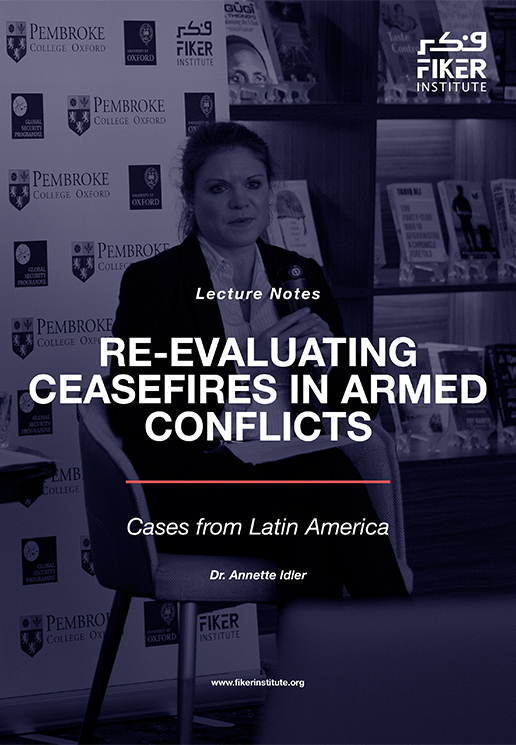
Re-Evaluating Ceasefires in Armed Conflicts: Cases from Latin America
As part of the newly launched Memorandum of Understanding between Fiker Institute and the University of Oxford’s Global Security Programme, Fiker Institute hosted Dr. Annette Idler, Director of the Global Security Programme at the University of Oxford’s Pembroke College and Associate Professor in Global Security at Oxford’s Blavatnik School of Government, for a public lecture on the role of ceasefire in global security.
HOW IS GLOBAL SECURITY DEFINED?
In her opening remarks, Dr. Idler conceptualized global security in terms of three domains: social, political, and economic. First, the social domain refers to local experiences of instability and insecurity. It encompasses human experiences of violence and the implications of living and growing up in conflict settings. Second, the economic domain refers to the security dimensions of transnational supply chains, given the interdependence of the global economy. This includes both vulnerabilities in legal supply chains as well as illicit supply chains that can undermine global security. Lastly, the political domain refers to states’ geo-strategic considerations and the global balance of power. These three domains are dynamic and interact with each other, highlighting that security is never static but is in constant flux.
WHAT ARE CEASEFIRES AND HOW ARE THEY ATTAINED?
Ceasefires are temporary cessations of violence. As such, ceasefires often freeze conflicts instead of solving them. Dr. Idler argued that ceasefires are not peace agreements per se and should not be considered as such. Highlighting the example of Colombia, she pointed out that ceasefires themselves can fuel perceptions of insecurity with the uncertainty of what comes next, exacerbating precarity.
Laying out the process of reaching a ceasefire, Dr. Idler contended that they often begin with negotiations. There are three schools of thought on how to analyze negotiations. One school looks at negotiations in terms of the relationship between conflict actors. This lens focuses on ways to improve trust between the parties of a negotiation and build trust between them. A second approach looks at the substance of the proposals being put forth. Scholars from this school of thought analyze both what is being negotiated and what the alternatives to a negotiated settlement are to parse conflict actors’ interests. Finally, a third school of thought looks at the ripeness of conflict and focuses on understanding the conflict cycle to determine the right timing for negotiations.
ARE THERE PERMANENT CEASEFIRES AND WHAT IS THE ROLE OF SPOILERS?
Dr. Idler argued that ceasefires should never be seen as a permanent arrangement. Ceasefires are always temporary, lasting from hours to months or years. To ensure ceasefires are upheld, there are typically ceasefire agreements in place, along with accompanying regulations to ensure that the ceasefire is not violated by the different parties involved.
She stressed that a long-term ceasefire, rather than a comprehensive peace agreement, risks freezing rather than solving conflicts. The case of Cyprus is an example of a long-term ceasefire where freezing the conflict was an important positive step that alleviated human suffering. However, the underlying grievances still exist and could erupt in a renewed conflict at any time. It is thus important to address the root causes of conflicts and understand the interests of the different players involved to ensure lasting peace.
Regarding risks to ceasefires, Dr. Idler mentioned that spoilers are always present and need to be taken into account when planning for peace talks. Spoilers can manifest in different ways, whether from one of the parties involved in the talks, or from external players with an interest in keeping the conflict ongoing.
IN THE ABSENCE OF THE US AS A MEDIATOR, WHAT ACTORS ARE WELL-SUITED TO FILL THE GAP?
Ceasefires are not the success of one person in particular; they are the outcome of the efforts of multiple entities. While certain parties might claim the success, there are always different actors, including grassroot organizations or advisors, that are instrumental to the process. Dr. Idler thus argued that no state or entity should be considered the go-to for mediation. Furthermore, it is important to move beyond a state-centric view of diplomacy as states are not the sole actors involved in mediation.
Ceasefire negotiations and peace processes should be tailored to the conflict in question as each conflict has unique dynamics and thus unique solutions. Dr. Idler warned against the method of copying and pasting solutions from one context to another. Moreover, she argued that it is crucial to draw on international organizations such as the United Nations, given its experience and institutional capacity, as well as regional leadership and organizations.
WHAT ROLES DO LOCAL ACTORS PLAY AND HOW DO ECONOMIC INCENTIVES SHAPE CEASEFIRE NEGOTIATIONS?
Considering the role of local leadership, Dr. Idler argued that religious leaders often play an influential, and often overlooked, role in solving conflict. Similarly, local initiatives are also often present yet ignored. She stressed the importance of amplifying the voices of religious, tribal, and ethnic leaders, and civil society organizations who are directly involved and who understand the needs and grievances of local communities.
Distinguishing between positive and negative economic incentives (i.e. sanctions), Dr. Idler argued that economic incentives can be important and useful. However, she reiterated that their utility is temporary as they fail to address the root causes of conflicts.
HOW CAN CURRENT FRAMEWORKS FOR CEASEFIRES BE RETHOUGHT?
Dr. Idler stated that dominant paradigms often fail to take into consideration what already exists. There is often a drive to build new institutions, such as committees or monitoring bodies, rather than build on and reform existing structures.
Making the positive case for ceasefires, Dr. Idler argued that they are crucial in alleviating human suffering and stopping the deaths of innocent people, even if it is just for a short period of time. Ceasefires should make us hopeful because they show that it is possible for enemy parties to come together and agree to put an end to violence.
The statements made and views expressed are solely the responsibility of the speaker, and do not represent Fiker Institute.
